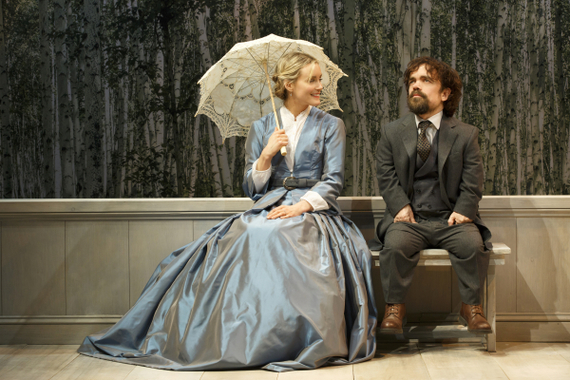Chekhov, like Flaubert, was a fan of Ivan Turgenev, a 19th-century Russian writer whose short stories about the feudal system first put him on the literary map. He was keen on the psychological life of his characters, especially evident in the often-performed A Month In The Country, now off-Broadway at CSC.
The play, set in the 1840s, addresses jealousy, youth and the vagaries of love. "The heart of another is a dark forest," muses Rakitin (Peter Dinklage), the best friend of Natalya and her husband Arkady (Anthony Edwards), a rich landowner.
Yet Rakitin is besotted with Natalya. Both members of a decaying upper class, they fixate on their own emotions. In particular, Natalya (a nuanced Taylor Schilling), is a beautiful but bored wife. That is, until she develops a passion for Aleksey (Mike Faist), her son's 21-year-old tutor, who is spending a month in the country with the family.
However, Natalya fears her teenage ward Vera (a wonderful Megan West) is also taken with the him -- and as Turgenev makes clear, the repercussions of desire are unforeseen and often destructive.
Indeed, the play dissects the infinite variety in love: Dr. Shpigelsky (Thomas Jay Ryan) proposes a mature connection with Lizaveta (Annabella Sciorra), while the servants Matvei (James Joseph O'Neil) and the much-younger Katya (Elizabeth Ramos), more primal in their desire, appear the happiest.
Such studies in class distinctions were Turgenev's strong suit.
The machinations and assumptions about love affairs and rivalries are played out against a backdrop of a Russia in the embryonic stages of transition. The translation by John Christopher Jones relies on modern vernacular to make it more accessible, while Mark Wendland's clean, minimalist set design is in stark contrast to the messy emotional turmoil on stage, allowing the audience to concentrate on the story.
Director Erica Schmidt keeps the pace brisk and elicits good performances from her cast. Actors often speak directly to the audience, making the production more intimate. Of special note are the scenes between West and Faist, who embody all the openness and anxiety of youth.
The heartache of love, whether unrequited or misconstrued, takes residence in A Month in the Country.
Support HuffPost
Our 2024 Coverage Needs You
Your Loyalty Means The World To Us
At HuffPost, we believe that everyone needs high-quality journalism, but we understand that not everyone can afford to pay for expensive news subscriptions. That is why we are committed to providing deeply reported, carefully fact-checked news that is freely accessible to everyone.
Whether you come to HuffPost for updates on the 2024 presidential race, hard-hitting investigations into critical issues facing our country today, or trending stories that make you laugh, we appreciate you. The truth is, news costs money to produce, and we are proud that we have never put our stories behind an expensive paywall.
Would you join us to help keep our stories free for all? Your contribution of as little as $2 will go a long way.
Can't afford to donate? Support HuffPost by creating a free account and log in while you read.
As Americans head to the polls in 2024, the very future of our country is at stake. At HuffPost, we believe that a free press is critical to creating well-informed voters. That's why our journalism is free for everyone, even though other newsrooms retreat behind expensive paywalls.
Our journalists will continue to cover the twists and turns during this historic presidential election. With your help, we'll bring you hard-hitting investigations, well-researched analysis and timely takes you can't find elsewhere. Reporting in this current political climate is a responsibility we do not take lightly, and we thank you for your support.
Contribute as little as $2 to keep our news free for all.
Can't afford to donate? Support HuffPost by creating a free account and log in while you read.
Dear HuffPost Reader
Thank you for your past contribution to HuffPost. We are sincerely grateful for readers like you who help us ensure that we can keep our journalism free for everyone.
The stakes are high this year, and our 2024 coverage could use continued support. Would you consider becoming a regular HuffPost contributor?
Dear HuffPost Reader
Thank you for your past contribution to HuffPost. We are sincerely grateful for readers like you who help us ensure that we can keep our journalism free for everyone.
The stakes are high this year, and our 2024 coverage could use continued support. If circumstances have changed since you last contributed, we hope you’ll consider contributing to HuffPost once more.
Already contributed? Log in to hide these messages.

